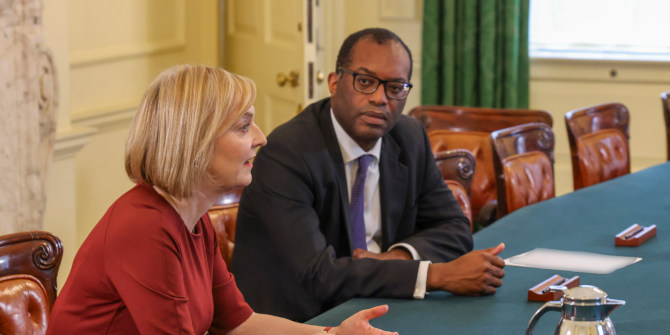 Current government policy, whatever its rhetoric, is to muddle on, trying to deter crossings, trying to return migrants to safe countries but recognising that borders are inevitably porous. Muddling on is often an under-rated policy option but the tragedy means this is no longer sustainable, argues Alan Manning.
Current government policy, whatever its rhetoric, is to muddle on, trying to deter crossings, trying to return migrants to safe countries but recognising that borders are inevitably porous. Muddling on is often an under-rated policy option but the tragedy means this is no longer sustainable, argues Alan Manning.
The recent death of over 20 migrants trying to cross the English Channel is a tragedy but not an unexpected one. Already more than 25,000 unauthorised migrants have crossed the Channel this year – more than three times the number who crossed in 2020, and 80 times more than in 2018.
Although the numbers of people using this route remains relatively low compared to the number of asylum seekers in other European countries and to previous periods in the UK, the rapid growth has led to a widespread impression that the government has lost control of this aspect of its borders when it promised Brexit would do the opposite.
Government proposals
The UK government has its ‘New Plan for Immigration’, though little in it is new or even much of a plan. One strategy is to disrupt the smugglers behind these crossings; all very well but as long as there is a demand for these crossings there will be smugglers who try to profit from them and find ways around the controls. This approach may limit crossings, but it will never eliminate them or even stop them increasing. The plan also offers a lesser degree of protection to those who enter the UK without authorisation; I have argued elsewhere this is mostly likely to lead to many migrants being condemned to live their lives in limbo. It is hard to believe this will deter many from making the crossing.
There is a vague plan for offshore processing – proposing that asylum seekers arriving in the UK this way should have their claims heard elsewhere; except no third country has been found to agree to this and it was not a sustainable policy when Australia tried it in Papua New Guinea and Nauru.
Then there is a plan to return migrants making the crossing to safe countries; except again the UK has very few agreements that make this an effective option – and Brexit has made returns to EU countries all but impossible.
The government seems determined to imitate Australia, which has managed to deter sea crossings through a policy of intercepting and turning or towing back any boats to the country of departure, Indonesia, and paying costs incurred. But little can be learned from the Australian experience; there are no international waters in the Channel, and the number of turnbacks was tiny compared to what would be required in the Channel. So few that you can read in 15 minutes an account of each incident; many of which were very harrowing. I doubt any policy like this would be sustainable in the Channel.
The bottom line is that the government does not have much of a plan to achieve its own narrow objectives of reducing crossings let alone achieve wider humanitarian goals.
Safe and legal routes
The main other proposal, often from migrant rights groups, is for more ‘safe and legal’ routes or a humanitarian visa. Migrants would not make these crossings if a safe and legal route was available, solving the ‘problem’ of Channel crossings. The challenge is how to define eligibility for these routes. If eligibility is defined narrowly and excludes many of those making the crossings, the crossings will continue. But define eligibility more widely than those currently crossing and there is a risk that the numbers eligible grow beyond what would be manageable administratively or politically.
A safe and legal route for all those currently in Northern France would be manageable in terms of numbers. But would this policy be credible? The risk is that another group of migrants arrive in Northern France (many of whom will have taken dangerous journeys to arrive at that point) and start crossing the Channel again – in anticipation of another one-off policy.
So perhaps widen existing family reunion rules, currently restricted to spouses and dependent children, a group that is inevitably limited in number. Few migrants making the crossing seem to have immediate family in the UK but many may have some extended family here. The risk here is that these rules lead to large numbers and a loss of control, something that rapidly undermines public confidence in the immigration system. For example, expand the definition of family to adult siblings, and it is effectively extended over time to the siblings’ spouses and the siblings’ spouse’s siblings and so on.
An agreement with France?
The only way to substantially reduce the numbers crossing the Channel is through an agreement with France. That is the lesson from previous episodes of unauthorised sea crossings. What agreement would effectively reduce the number of crossings?
Expanded safe and legal routes would be part of the agreement. There might be a cap on numbers, and priority given to those who have more links to the UK. But the UK would probably have to agree to take more refugees on these schemes than are currently crossing. However, it is likely that there would be some who would like to come to the UK who would not be admitted under these schemes. For this group, the incentive to cross the Channel would remain.
The way to make sure they do not attempt dangerous Channel crossings is if, on making it to the UK, they cannot stay. Returns to France would need to be part of the agreement (together with assurances about how they will be treated in France). France would need to be offered something in return for its agreement. Money is unlikely to be enough alone; but the expanded safe and legal routes from France is something the UK could offer.
An agreement like this offers something for everyone to like and loathe. It offers more safe and legal routes but with a returns policy and a limit on numbers many will dislike. For the government, it offers the prospect of reducing crossings, but accepting more asylum seekers from Europe, something unpopular with many of their supporters. But any solution needs more realism and compromise than our current polarised discussion allows. And the events of this week show it is needed quickly.
_____________________
 Alan Manning is Professor of Economics at the LSE and an Associate at LSE’s Centre for Economic Performance.
Alan Manning is Professor of Economics at the LSE and an Associate at LSE’s Centre for Economic Performance.
Photo by Thierry Meier on Unsplash.








We had an agreement with the French last year.. and we all know that the authorities just stood by and watched as migrants were just allowed to travel to the UK..the French don’t care..they will take our money and not deliver what they agreed!..the French are not to be trusted!
Fair analysis of the challenges, but the proposed “solutions” are pretty vague. There are no good technical solutions with or without an agreement with France. If we want to stop people making dangerous crossings, they either have to be prevented from travelling through France to the Channel coast (which is beyond the UK’s control), or we have to provide safe passage for all the asylum seekers and then manage their applications within the UK.